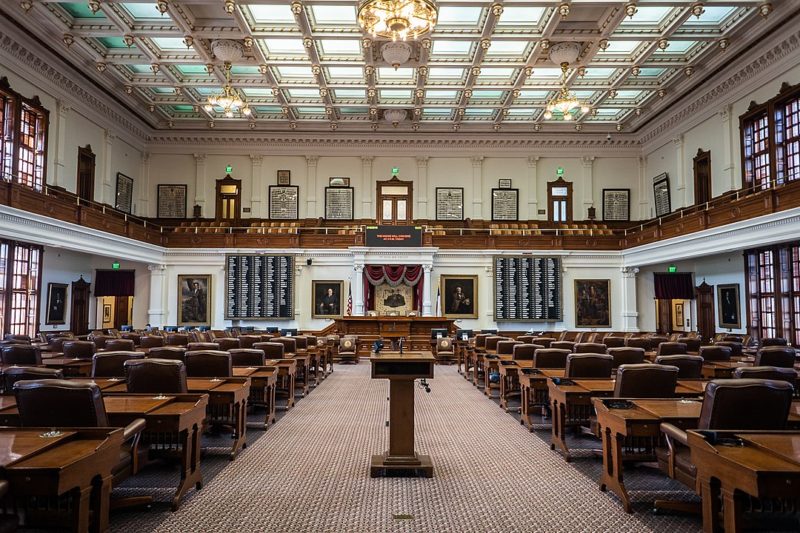The Texas Supreme Court has ordered a lower court to rescind a restraining order protecting House Democrats from arrest, saying that the legislature’s quorum-forcing arrest power is a “foundational pillar” of its constitutional authority.
The ruling is a blow to Democrats’ efforts to delegitimize and counteract the arrest warrants issued by Speaker Dade Phelan, who is attempting to secure a quorum through pressure, compulsion, and persuasion, but remains a handful of members short.
Phelan has issued warrants to the House sergeant-at-arms, who in turn deputized state troopers, asking him to forcibly bring Democrats to the House chamber. Phelan cited powers under the state constitution and House rules allowing him to do so. (Article 3, Section 10 of the Texas Constitution says in part that the Texas House may “compel the attendance of absent members, in such manner and under such penalties as (it) may provide”).
But Democrats sued in Travis County, arguing that “a fundamental principle of our constitutional system of government is that the State’s power to arrest and incarcerate cannot be used for political purposes.”
The petition said that the Democrats “have been deprived of their homes, families, friends, staff, and constituents for nearly one month,” because they fear “seizure of their liberty without due process.”
Travis County Judge Brad Urrutia was convinced by the Democrat legislators’ arguments, writing in his August 8 restraining order that Phelan “erroneously interpreted Texas law and legislative rules to permit the detention, confinement, or other restriction of other members of the Texas House of Representatives within the State of Texas in response to a call for quorum.”
“Plaintiffs will suffer imminent and irreparable harm by either loss of liberty or the loss of real and personal property, personal, professional and political relationships with family, friends, staff, and constituents, and mental anguish of being separated from home.”
A week later, the Texas Supreme Court ruled that Urrutia “very clearly abused (his) discretion by issuing the temporary restraining order.”
In an 18-page opinion, Supreme Court Justice Jimmy Blacklock wrote, “Article III of our constitution has become a lengthy document over the years. Its opening sections, however, date to the advent of Texas statehood or before. They establish the foundational pillars of the legislature’s constitutional authority, of which section 10 is a structural component.”
“Section 10 represents a conscious decision by those who framed our constitution to counterbalance the minority’s quorum-breaking ability with a quorum-forcing authority vested in the present members. They patterned this quorum-forcing authority on the federal constitution, which has long been interpreted to authorize arrest and imprisonment to force a quorum.”
“We are provided with no reason to doubt that the framers of our constitution understood article III, section 10 to operate just as it has been understood to operate in the many decades since its ratification—to authorize each chamber to compel the attendance of absent members, by physical compulsion if necessary. We decline Plaintiffs’ invitation to undermine this foundational authority, which has long been embedded in the very structure of our government.”
Blacklock also addressed arguments that the quorum-forcing authority under the state constitution contradicted other state and federal constitutional protections. He pointed out that the federal constitution contains a nearly identical provision allowing Congress to compel the attendance of absent members.
“While Congress’s quorum rule is one-half instead of two-thirds, Congress’s quorum-forcing power closely mirrors the Texas Legislature’s. In Kilbourn, the U.S. Supreme Court interpreted the federal constitution’s quorum-forcing language to vest expansive power in Congress to determine the ‘Manner’ by which to compel ‘the Attendance of absent Members.’ In the Court’s words, ‘the penalty which each House is authorized to inflict in order to compel attendance of absent members may be imprisonment,’” Blacklock wrote.
“If ‘imprisonment’ is a valid exercise of Congress’s quorum-forcing power under functionally identical constitutional text, then surely the ‘arrest’ and ‘restraint’ provided by the Texas House Rules are valid as well,” he added.
The Texas Supreme Court also took issue with the manner in which the Travis County case was conducted, saying it should have involved both parties, not just one. Given the high political stakes of the issue, both parties should have been represented, he said: “Whatever one’s view of the politics of the situation, it should be clear that an ex parte proceeding where one side is totally shut out of the process was an improper way to resolve matters of such significance.”
The case was styled In re Greg Abbott, in his official capacity as governor of the State of Texas, Matthew Dade Phelan, in his official capacity as the Speaker of the House of Representatives; and the State of Texas; from Travis County.
The plaintiffs in the case were 19 House Democrats: Gina Hinojosa, Alma Allen, Michelle Beckley, Jasmine Crockett, Joe Deshotel, Barbara Gervin-Hawkins, Vikki Goodwin, Celia Israel, Ray Lopez, Armando Martinez, Trey Martinez-Fischer, Ina Minjarez, Christina Morales, Mary Ann Perez, Ana-Maria Ramos, Richard Peña Raymond, Ron Reynolds, Eddie Rodriguez, and Ramon Romero, Jr.
The case was decided without oral argument. None of the justices dissented.
